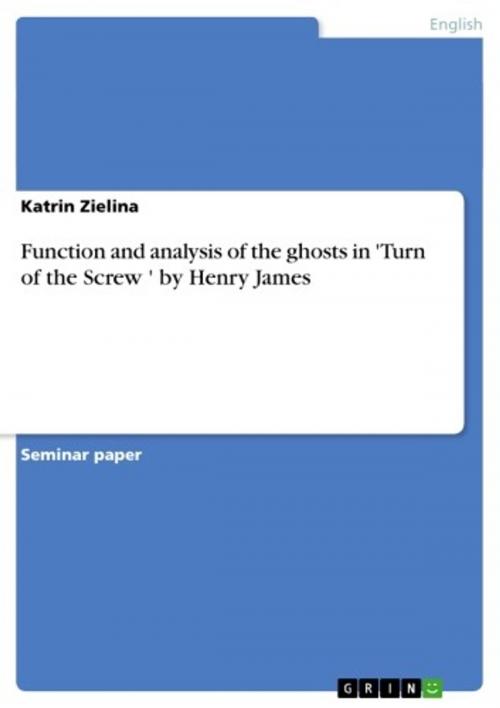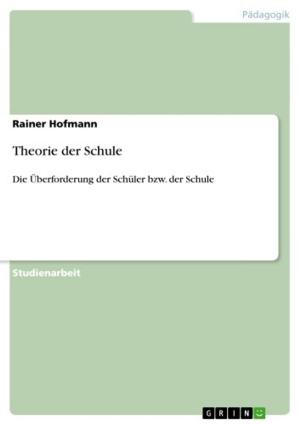Function and analysis of the ghosts in 'Turn of the Screw ' by Henry James
Nonfiction, Entertainment, Drama, Anthologies| Author: | Katrin Zielina | ISBN: | 9783638189125 |
| Publisher: | GRIN Verlag | Publication: | May 1, 2003 |
| Imprint: | GRIN Verlag | Language: | English |
| Author: | Katrin Zielina |
| ISBN: | 9783638189125 |
| Publisher: | GRIN Verlag |
| Publication: | May 1, 2003 |
| Imprint: | GRIN Verlag |
| Language: | English |
Seminar paper from the year 2002 in the subject American Studies - Literature, grade: 2+ (B), University of Frankfurt (Main) (Institute for England und American Studies), course: Introduction to Literature Studies, 7 entries in the bibliography, language: English, abstract: Henry James's 'The Turn Of The Screw' has been often interpreted since it was first published in 1898. There are a lot of hints in the story, but those hints are rarely stated directly. So the difficulty in reading and judging the story in one certain way makes it even more challenging to read. Until today critics have not come to an agreement whether Miles and Flora or only the governess are haunted by the ghosts. So one might pose the question 'When do critics ever share the same opinion?'. After all there are always different people with different opinions who read one and the same story completely different at all. But nevertheless every author has a certain intention, the purpose to convey a message by writing the story down. Possibly the openness to various interpretations is the point of the novel. Basically this is what every reader should have in mind. Many questions move critics concerning 'The Turn Of The Screw', e. g. 'What does the governess really see while her encounters with those apparitions?', 'How can she describe the dead Peter Quint that detailed without ever having seen him before?' and -most essentially- 'How did Miles come to death in the end?'. Every question itself is interesting enough, but I find the question most exciting, what the ghosts represent if they are no real supernatural apparitions. It seems to be clear that only the governess is able to see the ghosts. As far as I remember there is no single hint that is evidenced clearly in the whole story that Mrs. Grose or the children are also able to recognize the ghosts. So possibly only the governess is haunted by the apparitions for reasons that have to be analyzed more deeply.
Seminar paper from the year 2002 in the subject American Studies - Literature, grade: 2+ (B), University of Frankfurt (Main) (Institute for England und American Studies), course: Introduction to Literature Studies, 7 entries in the bibliography, language: English, abstract: Henry James's 'The Turn Of The Screw' has been often interpreted since it was first published in 1898. There are a lot of hints in the story, but those hints are rarely stated directly. So the difficulty in reading and judging the story in one certain way makes it even more challenging to read. Until today critics have not come to an agreement whether Miles and Flora or only the governess are haunted by the ghosts. So one might pose the question 'When do critics ever share the same opinion?'. After all there are always different people with different opinions who read one and the same story completely different at all. But nevertheless every author has a certain intention, the purpose to convey a message by writing the story down. Possibly the openness to various interpretations is the point of the novel. Basically this is what every reader should have in mind. Many questions move critics concerning 'The Turn Of The Screw', e. g. 'What does the governess really see while her encounters with those apparitions?', 'How can she describe the dead Peter Quint that detailed without ever having seen him before?' and -most essentially- 'How did Miles come to death in the end?'. Every question itself is interesting enough, but I find the question most exciting, what the ghosts represent if they are no real supernatural apparitions. It seems to be clear that only the governess is able to see the ghosts. As far as I remember there is no single hint that is evidenced clearly in the whole story that Mrs. Grose or the children are also able to recognize the ghosts. So possibly only the governess is haunted by the apparitions for reasons that have to be analyzed more deeply.















